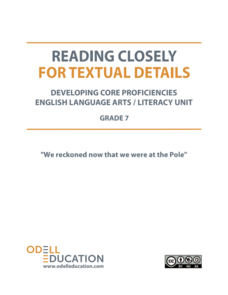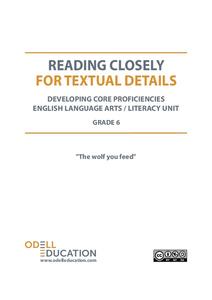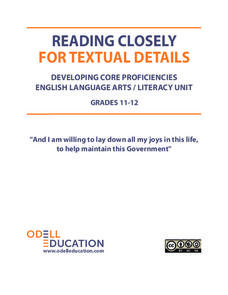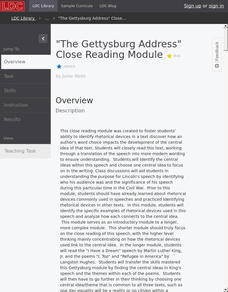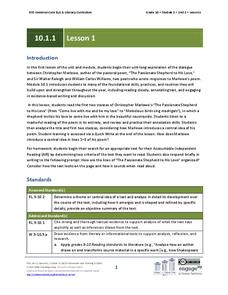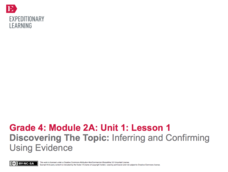Odell Education
Reading Closely For Textual Details: Grade 8
Only a thorough understanding of history can save us from repeating it. Practice close reading skills with an eighth grade unit that focuses on 19th century America, including European immigration into Ellis Island and Frederick...
Odell Education
Reading Closely for Textual Details: Grade 7
Enhance the reading experience with a set of lessons designed to improve textual analysis. Seventh graders use guiding questions to read both informational text and literature closely in the first part of the unit. Next, they work on...
Odell Education
Reading Closely for Textual Details: Grade 6
Close reading doesn't mean to literally read text close to your face, but rather to pay attention to particular details in order to develop a deep and purposeful understanding of text. The first part of a five-part resource provides an...
Curated OER
Character Analysis and The Crucible
Readers of The Crucible use a SATDO chart to collect evidence they will use to craft interpretive statements and an analysis of one of Miller’s characters. Background information on the play and about Miller, links to handouts,...
National Endowment for the Humanities
Language Analysis Based on Stave 1
Class members meet the original scrooge, the Dickens character whose name has become synonymous with a cold-hearted, tight-fisted, miser. Using the provided worksheet, readers closely examine context clues to determine the meanings of...
Curated OER
Express Yourself Lesson Seed 6 Close Reading
Look back at the third chapter of The Cay with your class. Pupils will conduct a close reading, taking a second look at a chunk of text and responding to a series of text-dependent questions. Wrap up with an analytical writing prompt...
EngageNY
Grade 9 ELA Module 2: Unit 1, Lesson 6
It may not be 4 o'clock in the morning when you have ended these labors, but it's still time to work on textual analysis. Study the resolution of Edgar Allan Poe's "The Tell-Tale Heart" through the thematic lens of guilt and confession,...
Odell Education
Reading Closely for Textual Details: Grade 12
Help your class examine humanity's unpredictable nature through "Life Steps Almost Straight." Learners read various works from philosophers such as Viktor Frankl, The Buddha, and Nietzsche to gather textual evidence and explain their...
Odell Education
Reading Closely for Textual Details: "And I am willing to lay down all my joys in this life..."
Look closely, some details are hidden! Scholars learn how to find attributes by first examining characteristics in illustrations and then move to locating details in text with close reading. The teacher models good practices for...
Hawaiʻi State Department of Education
When We Are A Story
Drama and story elements go hand-in-hand. Have the class dive into a dramatic play to show character intention, conflict resolution, main events, and the dialogue in a Hawaiian folk tale. They read the story, then group-up to discuss and...
Southern Nevada Regional Professional Development Program
Close Reading in the Classroom
Close reading is key to the analysis and interpretation of literature. A close reading of the title and the epigraph of “The Love Song of J. Alfred Prufrock” offers readers an opportunity to examine how even single words or names can...
ReadWriteThink
Sonic Patterns: Exploring Poetic Techniques Through Close Reading
Robert Hayden's poem "Those Winter Sundays" serves as the anchor text in a five-part lesson that takes the mystery out of poetry analysis by modeling explicit strategies for pupils to employ to conduct a close reading of a poem. After...
Deer Valley Unified School District
Close Reading: Analyzing Mood and Tone
The AP Literature and Composition exam is all about close reading. Test takers are presented with a passage and asked to analyze how an author uses literary devices to create a desired effect. Prepare your students for the exam with a...
Curated OER
Lesson 2-Profiles in Courage: To Kill A Mockingbird and the Scottsboro Boys Trial
Review one of the most memorable cases in the history of the United States. After reading To Kill A Mockingbird, young scholars read and select court transcripts and other primary source material from the Scottsboro Boys Trial of 1933....
Literacy Design Collaborative
"The Gettysburg Address" Close Reading Module
It's time to think deep and narrow. Scholars focus close reading on one short text but task take their thinking to a deep level. Readers use a Rhetorical Analysis Chart to analyze The Gettysburg Address and determine how Lincoln used...
K20 LEARN
We've Got Character! Literary Analysis: Characterization
How authors bring characters to life and make them believable is the focus of a lesson on characterization. Readers closely examine passages from To Kill a Mockingbird and Dreamland Burning, noting details that reveal the character's...
EngageNY
Mid-Unit 2 Assessment: On-Demand Informational Writing
Lesson 7 focuses on building academic vocabulary and writing an explanatory letter with supported textual evidence. For the first five minutes of the instructional activity, the educator reminds the class of how to read and refer to the...
EngageNY
Grade 9 ELA Module 3, Unit 1, Lesson 6
Are cattle prods beneficial for herding cattle, or do they cause more harm than good? Investigate Temple Grandin's claim about animal behavior with a lesson that focuses on pages 20-23 of the first chapter of her book, Animals in...
EngageNY
Grade 9 ELA Module 3, Unit 1, Lesson 1
Clear up the misconceptions about autism and individuals on the autism spectrum with an inquiry-based instructional activity. As ninth graders read the first four pages of Temple Grandin's Animals in Translation: Using the Mysteries of...
Polk Bros Foundation
I Can Analyze a Story or History Completely and Carefully
Start off analysis of a text with a worksheet that asks pupils to complete several tasks. Class members note down a couple of characters or people and their distinguishing traits, describe the most important event, summarize the text...
EngageNY
Grade 10 ELA Module 1: Unit 1, Lesson 1
Can authors speak to each other across works, genres, and centuries? Study the conversation between Christopher Marlowe in his poem "The Passionate Shepherd to His Love" and the responses by Sir Walter Raleigh and William Carlos Williams...
EngageNY
Grade 10 ELA Module 2: Unit 2, Lesson 10
All good things must come to an end! Scholars put all their learning into practice by completing an end-of-unit assessment. They use textual evidence from Julia Alvarez's "A Genetics of Justice" to write essays analyzing how Alvarez...
EngageNY
Discovering the Topic: Inferring and Confirming Using Evidence
Allow your class to figure out what they will be studying through an inquiry-based anticipatory set that involves analysis of mystery documents and practice with making inferences. The lesson plan document includes a detailed description...
EngageNY
Analyzing the Author’s Perspective: “Equal Rights for Women” by Shirley Chisholm
It's all about perspective. Scholars talk about the meaning of perspective and look closely at the point of view of Equal Rights for Women. They discuss how Chisholm addresses the views of others and complete a close reading guide to...



